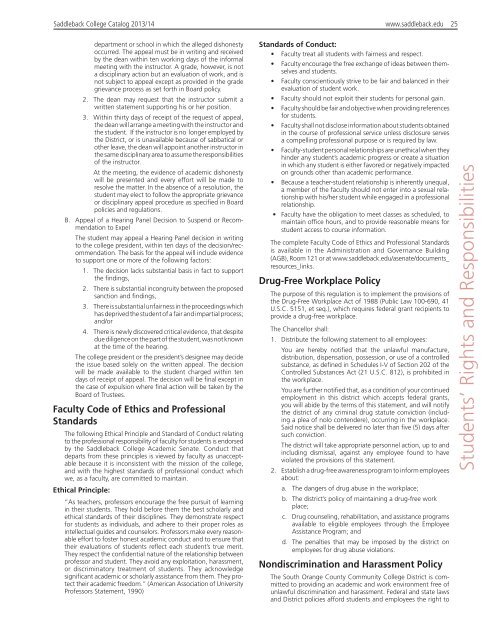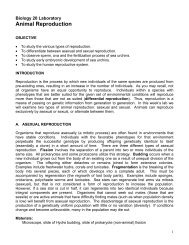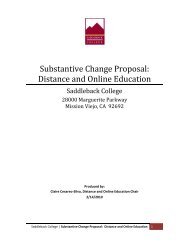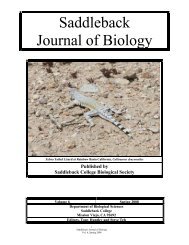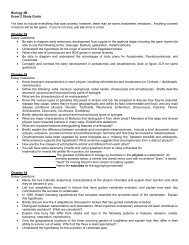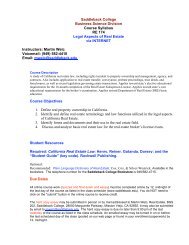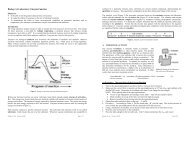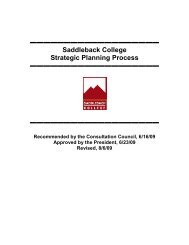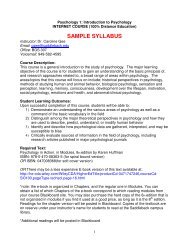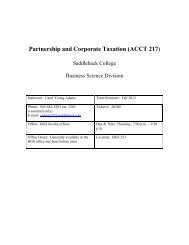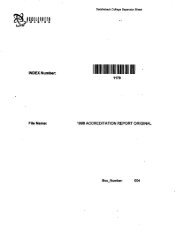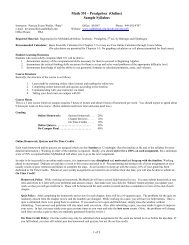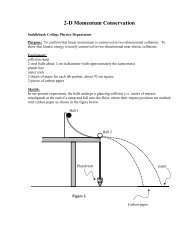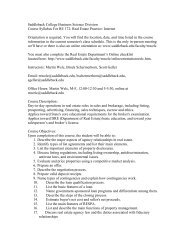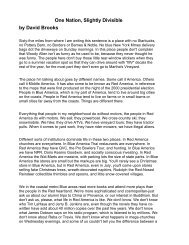Students - Saddleback College
Students - Saddleback College
Students - Saddleback College
You also want an ePaper? Increase the reach of your titles
YUMPU automatically turns print PDFs into web optimized ePapers that Google loves.
<strong>Saddleback</strong> <strong>College</strong> Catalog 2013/14 www.saddleback.edu 25<br />
department or school in which the alleged dishonesty<br />
occurred. The appeal must be in writing and received<br />
by the dean within ten working days of the informal<br />
meeting with the instructor. A grade, however, is not<br />
a disciplinary action but an evaluation of work, and is<br />
not subject to appeal except as provided in the grade<br />
grievance process as set forth in Board policy.<br />
2. The dean may request that the instructor submit a<br />
written statement supporting his or her position.<br />
3. Within thirty days of receipt of the request of appeal,<br />
the dean will arrange a meeting with the instructor and<br />
the student. If the instructor is no longer employed by<br />
the District, or is unavailable because of sabbatical or<br />
other leave, the dean will appoint another instructor in<br />
the same disciplinary area to assume the responsibilities<br />
of the instructor.<br />
At the meeting, the evidence of academic dishonesty<br />
will be presented and every effort will be made to<br />
resolve the matter. In the absence of a resolution, the<br />
student may elect to follow the appropriate grievance<br />
or disciplinary appeal procedure as specified in Board<br />
policies and regulations.<br />
B. Appeal of a Hearing Panel Decision to Suspend or Recommendation<br />
to Expel<br />
The student may appeal a Hearing Panel decision in writing<br />
to the college president, within ten days of the decision/recommendation.<br />
The basis for the appeal will include evidence<br />
to support one or more of the following factors:<br />
1. The decision lacks substantial basis in fact to support<br />
the findings,<br />
2. There is substantial incongruity between the proposed<br />
sanction and findings,<br />
3. There is substantial unfairness in the proceedings which<br />
has deprived the student of a fair and impartial process;<br />
and/or<br />
4. There is newly discovered critical evidence, that despite<br />
due diligence on the part of the student, was not known<br />
at the time of the hearing.<br />
The college president or the president’s designee may decide<br />
the issue based solely on the written appeal. The decision<br />
will be made available to the student charged within ten<br />
days of receipt of appeal. The decision will be final except in<br />
the case of expulsion where final action will be taken by the<br />
Board of Trustees.<br />
Faculty Code of Ethics and Professional<br />
Standards<br />
The following Ethical Principle and Standard of Conduct relating<br />
to the professional responsibility of faculty for students is endorsed<br />
by the <strong>Saddleback</strong> <strong>College</strong> Academic Senate. Conduct that<br />
departs from these principles is viewed by faculty as unacceptable<br />
because it is inconsistent with the mission of the college,<br />
and with the highest standards of professional conduct which<br />
we, as a faculty, are committed to maintain.<br />
Ethical Principle:<br />
“As teachers, professors encourage the free pursuit of learning<br />
in their students. They hold before them the best scholarly and<br />
ethical standards of their disciplines. They demonstrate respect<br />
for students as individuals, and adhere to their proper roles as<br />
intellectual guides and counselors. Professors make every reasonable<br />
effort to foster honest academic conduct and to ensure that<br />
their evaluations of students reflect each student’s true merit.<br />
They respect the confidential nature of the relationship between<br />
professor and student. They avoid any exploitation, harassment,<br />
or discriminatory treatment of students. They acknowledge<br />
significant academic or scholarly assistance from them. They protect<br />
their academic freedom.” (American Association of University<br />
Professors Statement, 1990)<br />
Standards of Conduct:<br />
• Faculty treat all students with fairness and respect.<br />
• Faculty encourage the free exchange of ideas between themselves<br />
and students.<br />
• Faculty conscientiously strive to be fair and balanced in their<br />
evaluation of student work.<br />
• Faculty should not exploit their students for personal gain.<br />
• Faculty should be fair and objective when providing references<br />
for students.<br />
• Faculty shall not disclose information about students obtained<br />
in the course of professional service unless disclosure serves<br />
a compelling professional purpose or is required by law.<br />
• Faculty-student personal relationships are unethical when they<br />
hinder any student’s academic progress or create a situation<br />
in which any student is either favored or negatively impacted<br />
on grounds other than academic performance.<br />
• Because a teacher-student relationship is inherently unequal,<br />
a member of the faculty should not enter into a sexual relationship<br />
with his/her student while engaged in a professional<br />
relationship.<br />
• Faculty have the obligation to meet classes as scheduled, to<br />
maintain office hours, and to provide reasonable means for<br />
student access to course information.<br />
The complete Faculty Code of Ethics and Professional Standards<br />
is available in the Administration and Governance Building<br />
(AGB), Room 121 or at www.saddleback.edu/asenate/documents_<br />
resources_links.<br />
Drug-Free Workplace Policy<br />
The purpose of this regulation is to implement the provisions of<br />
the Drug-Free Workplace Act of 1988 (Public Law 100-690, 41<br />
U.S.C. 5151, et seq.), which requires federal grant recipients to<br />
provide a drug-free workplace.<br />
The Chancellor shall:<br />
1. Distribute the following statement to all employees:<br />
You are hereby notified that the unlawful manufacture,<br />
distribution, dispensation, possession, or use of a controlled<br />
substance, as defined in Schedules I-V of Section 202 of the<br />
Controlled Substances Act (21 U.S.C. 812), is prohibited in<br />
the workplace.<br />
You are further notified that, as a condition of your continued<br />
employment in this district which accepts federal grants,<br />
you will abide by the terms of this statement, and will notify<br />
the district of any criminal drug statute conviction (including<br />
a plea of nolo contendere), occurring in the workplace.<br />
Said notice shall be delivered no later than five (5) days after<br />
such conviction.<br />
The district will take appropriate personnel action, up to and<br />
including dismissal, against any employee found to have<br />
violated the provisions of this statement.<br />
2. Establish a drug-free awareness program to inform employees<br />
about:<br />
a. The dangers of drug abuse in the workplace;<br />
b. The district’s policy of maintaining a drug-free work<br />
place;<br />
c. Drug counseling, rehabilitation, and assistance programs<br />
available to eligible employees through the Employee<br />
Assistance Program; and<br />
d. The penalties that may be imposed by the district on<br />
employees for drug abuse violations.<br />
Nondiscrimination and Harassment Policy<br />
The South Orange County Community <strong>College</strong> District is committed<br />
to providing an academic and work environment free of<br />
unlawful discrimination and harassment. Federal and state laws<br />
and District policies afford students and employees the right to<br />
<strong>Students</strong>’ Rights and Responsibilities


